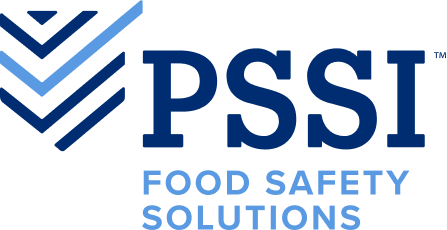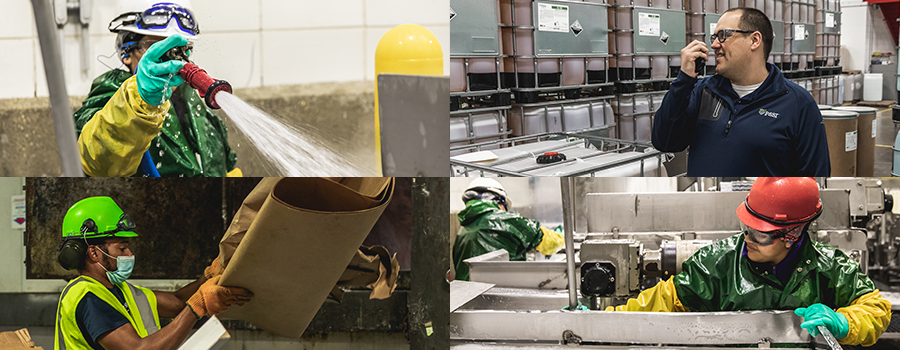More effective sanitation and food safety management does not always mean more water, chemicals, or resource usage. What it does mean is finding the right partner that can work smarter to decrease wasteful spending to help your business meet sustainability goals, while delivering consistent food safety results.
Conservation is a top focus for our team at PSSI as part of a broad Environmental Initiative to continue finding new ways to improve and innovate our approach as a top sanitation and food safety partner. This effort requires communication and collaboration across various areas, including sanitation, chemical, intervention and pest, as well as specified teams in charge of new monitoring and reporting technology and new product development.
“As a leading sanitation and food safety partner our job is not only to ensure protection at the highest level, but to make sure we are doing it in the most cost-effective way possible and leaving the smallest environmental footprint as possible,” said Doug White, President of PSSI.
PSSI’s Environmental Initiative has four key areas of focus that enhance the quality of our work and help support a higher level of conservation and sustainability across the industry:
Water Conservation
PSSI set a goal to save 2 billion gallons of water by 2026. This starts with the ability to accurately track water usage across the sanitation shift as the first step for water conservation. PSSI, together with its partner Safe Foods, has one of most innovative technology platforms across the industry that monitors and reports water usage in real-time. This allows sanitation teams and our partners to compare water usage on a plant-by-plant basis and adjust plans accordingly.
Another key component is the use of new auto shut-off nozzle technology on the hoses during the sanitation process that has shown to save 10% or more in daily water consumption across many plants PSSI supports. It also includes new engineering solutions that monitor water temperature and pressure, which play a vital role in the sanitation process.
Innovative technology like Cyclean™, Safe Foods proprietary water reuse technology, also has a huge impact on water conservation. Cyclean enables the reuse and recycling of production water that would otherwise go down the drain. On average, currently installed Cycleans collectively reuse more than 1.5 million gallons of water per day on average across the industry.
Environmentally Friendly Products
PSSI Chemical Innovations and Safe Foods continue to develop and integrate more green products as part of its chemical portfolio. These include the reformulated PSSI-262 General Cleaner, Drip Grip and Pure products that are all that are highly effective chemicals that are bio-based and eco-friendly.
Cecure® is also a product that has proven to significantly extend the shelf-life of poultry products, resulting in less food waste. Food processors have reported an average 4% reduction in spend and 19% reduction in peracetic acid (PAA) usage when using Cecure.
SQF & LEED Certification
PSSI Chemical Innovations and Safe Foods have both earned the prestigious Safe Quality Foods (SQF) Certification verifying the quality and safety of its products. The Safe Foods headquarters in North Little Rock, Arkansas is also LEED (Leadership in Energy and Environmental Design) Silver certified. LEED is a nationally recognized green building rating system that addresses the site, water, energy, materials, and indoor environmental quality of a facility and its grounds. This state-of-the-art facility uses low flow fixtures throughout the facility that reduce the annual water usage by 32%. The building’s low mercury lighting and high-efficiency HVAC systems save almost 30% in energy costs per year over a comparable building of this size and use.
Recycling and Reduction of Packaging Waste
Decreasing the overall amount of waste and finding ways to repurpose or recycle cardboard, wood boards, shrink wrap and other materials is not only better for the environment but can also have a significant impact on bottom line costs. As part of its integrated approach, PSSI helps its food processing and warehouse partners define a strategy and manage a process to separate material that minimizes the number of trash pick-ups per week and increases overall recycling revenue. In some cases, PSSI partners have been successful in cutting their trash pick-ups almost in half, saving thousands of dollars per month.
Safe Foods is working to reduce packaging waste in the delivery of caustic through piloting the use of re-usable totes in two facilities. Safe Foods has also implemented a new process by consolidating products using bulk delivery. This not only reduces the generation of waste totes that have a negative impact across the industry, but it also increases safety by reducing the handling of products.

